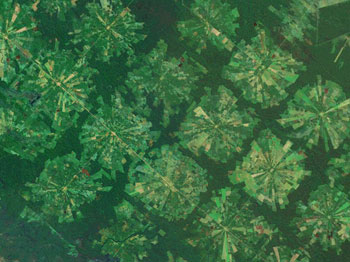Amazon soy becomes greener
Amazon soy becomes greener
mongabay.com
July 25, 2006
Brazilian soy crushers and exporters will implement a two-year moratorium on trading soybeans grown on newly deforested lands in the Amazon basin. The governance program takes effect in October 2006 and applies only to forest cleared after that date.
 Agricultural clearing in the Amazon rainforest. Satellite image courtesy of NASA |
The announcement follows an investigation by environmental group Greenpeace that found soy cultivation is contributing to deforestation in the Amazon.
Thanks to a new variety of soybean developed by Brazilian scientists to flourish in rainforest climate, soybean production has boomed in the region in recent years as firms have converted extensive areas of rainforest and cerrado, a savanna-like ecosystem, into industrial soybean farms. High soybean prices have also served as an impetus to expanding soybean cultivation and Brazil is on the verge of supplanting the United States as the world’s leading exporter of soybeans.
Philip Fearnside, co-author of a report in the journal Science and member of Brazil’s National Institute for Amazonian Research in Manaus, explains, “Soybean farms cause some forest clearing directly. But they have a much greater impact on deforestation by consuming cleared land, savanna, and transitional forests, thereby pushing ranchers and slash-and-burn farmers ever deeper into the forest frontier. Soybean farming also provides a key economic and political impetus for new highways and infrastructure projects, which accelerate deforestation by other actors.”
The new initiative, led by the Brazilian Association of Vegetable Oil Producers and the National Grains Exporters’ Association, “seeks to reconcile environmental conservation with economic development, through the responsible and sustainable use of Brazil’s natural resources,” according to a joint statement from the groups.
The groups say that during the two-year period, the agricultural sector will work with the Brazilian government to prepare an effective mapping and monitoring system for the Amazon biome, develop strategies to encourage soy producers to comply with the Brazilian forestry laws, and work with other groups to layout rules on how to conduct operations in the region. They say the industry will not buy soy from plantations that use slave labor.
According to Reuters, large multinational firms like Archer Daniels Midland Co., Bunge, Cargill and Louis Dreyfus will join the effort.
The Amazon is the world’s largest and most diverse expanse of intact forest in the world. Experts estimate that 15-20 percent of its 1.6 million square miles (4.1 million square kilometers) have been destroyed and warn that climate change could put further area at risk in the near future.